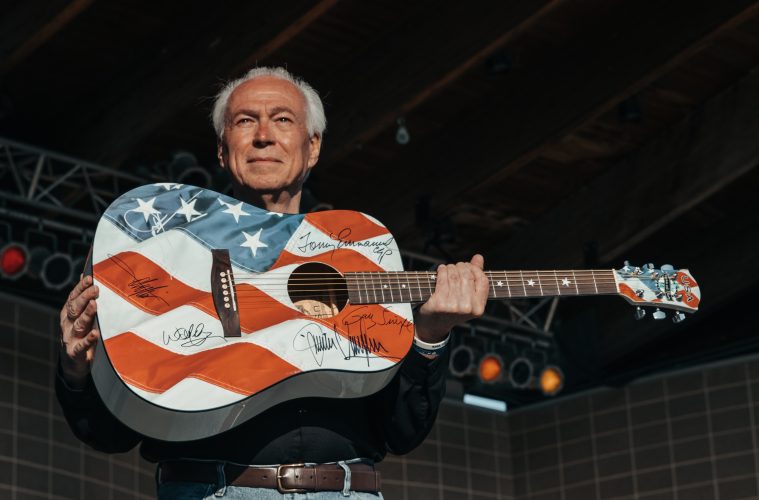For military veterans suffering from PTSD, music can be a great answer, thanks to the work of Guitars 4 Vets.
Music’s many benefits have long been touted in the pages of the Music & Sound Retailer, including as recently as January, when we published a feature story about how music has greatly benefited those in prisons. But one thing we have not highlighted is the tremendous positive affect music has on America’s military. We truly salute their service.
But often, after returning home from combat, veterans must deal with Post Traumatic Stress Disorder (PTSD). Success of treatments for PTSD can be spotty at best. But one thing that has helped soldiers deal with trauma is music. And at the forefront of helping members of the military suffering from PTSD is Patrick Nettesheim, co-founder of Guitars 4 Vets Inc., a 501 (c) (3) non-profit organization that strives to enhance the lives of wounded veterans by providing them with free guitars and music instruction.
According to Guitars 4 Vets (also known as G4V), “Through self-expression and the healing power of music, it is our intent to restore the feelings of joy and purpose that can be lost after suffering trauma.”
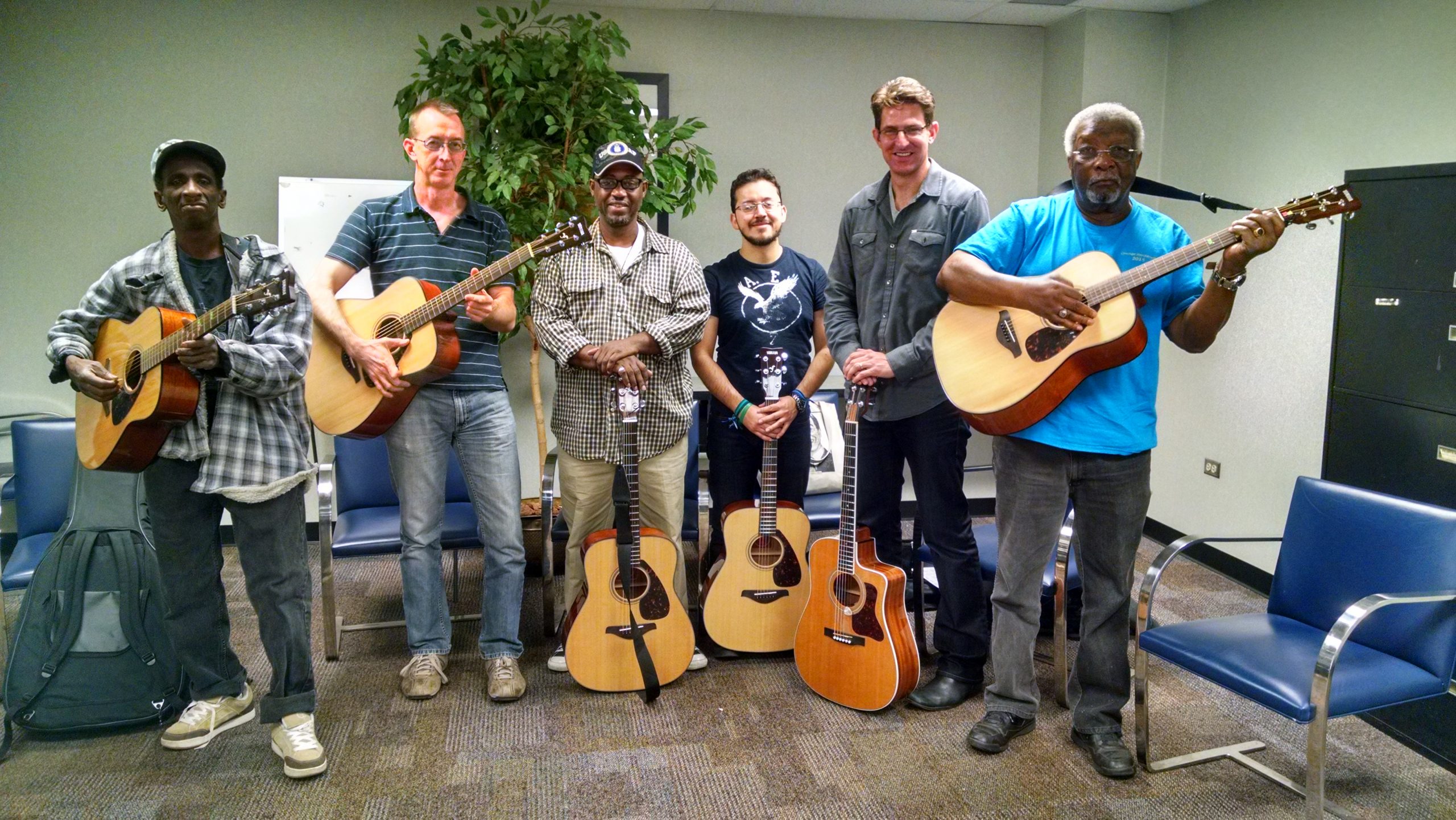
A Guitars 4 Vets alumni group meets in Chicago.
Nettesheim loved music from an early age and first became a guitar instructor at age 16. He also played in a band. “In my early 20s, I came to the realization that playing in a band in Milwaukee, Wis., was a dead end,” Nettesheim told the Music & Sound Retailer. “And then, after moving around the country, I realized playing in a band just about anywhere was a dead end because I wasn’t born into royalty. I did not have a celebrity parent, and I didn’t have the money to pay the people you need to get to. Bands do succeed the old-fashioned way, but it has been a little more difficult the last 30 years.”
Guitars 4 Vets nearly never happened. In 2006, Nettesheim recalled playing in three bands while still teaching private guitar lessons. He received a call from a potential client, Dan Van Buskirk, about taking lessons, but Nettesheim did not call him back for a while. “A week went by, and I said I better call this guy, because I was being unprofessional,” Nettesheim relayed. “I called and he said he didn’t hear back from me, so he signed up with another guitar instructor. I told him the person he would be taking lessons from would be good. But he asked me how I taught. I asked what he wanted to learn, and he said ‘Take it Easy’ by The Eagles. I said, ‘That’s great. That deals with basic open chords and is a catchy song. It is fun to play.’ Van Buskirk responded, ‘Do you think this guy would be upset if I came to you for lessons?’ I said, ‘No, I have sent him people before who are a better fit.’”
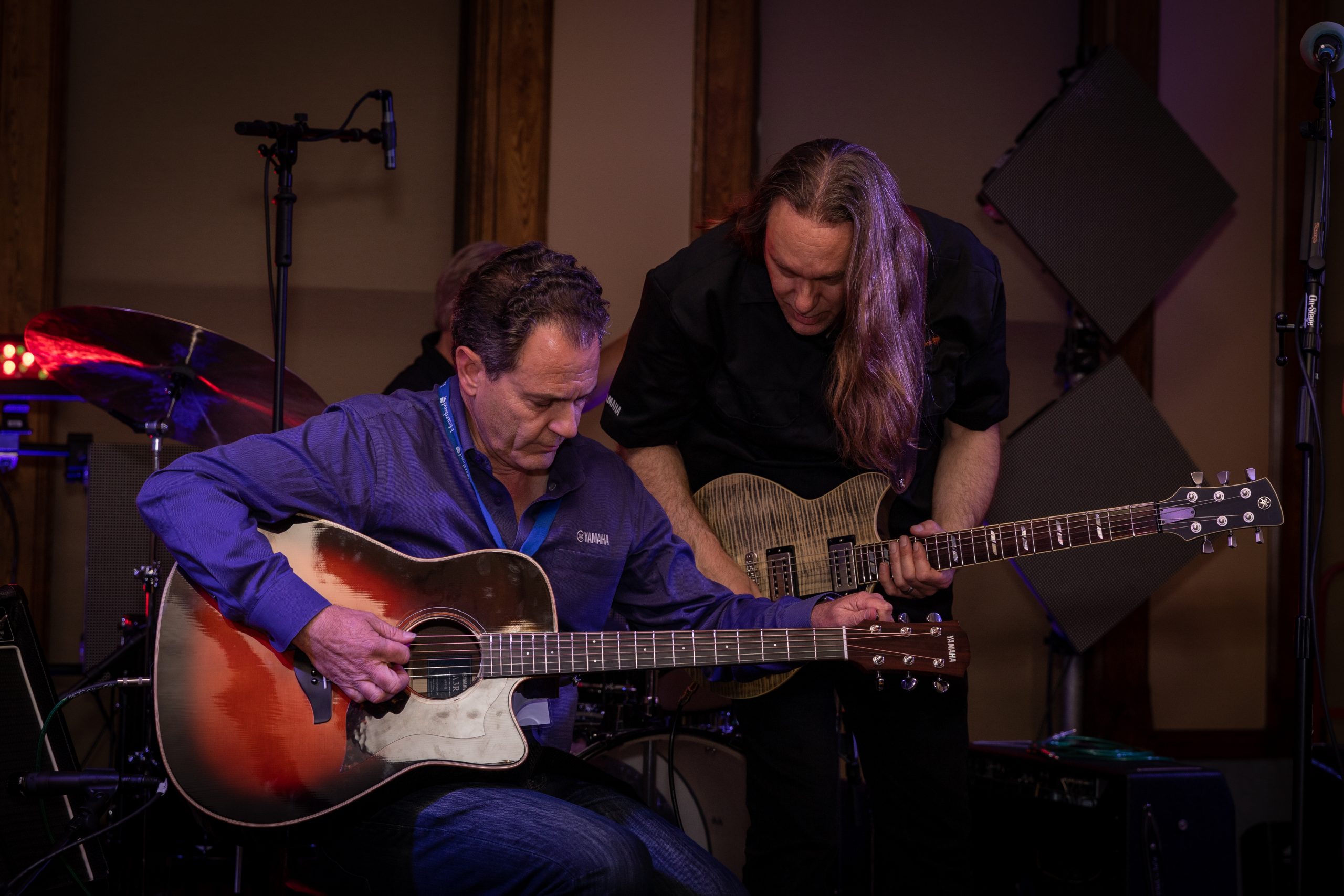
Yamaha CEO Tom Sumner and Patrick Nettesheim
Van Buskirk came in for a lesson about a week later, and he and Nettesheim got along extremely well. “He said to me, ‘Just so you know, I have a disability called PTSD,’” remembered Nettesheim. “He had served in the Vietnam War, first Marine recon in 1968 and 1969 in an area called Da Nang. He would share his stories with me, and in the meantime, he was learning how to play the instrument. It really helped him a lot. Once you get that stuff off your chest, you are able to learn.”
Van Buskirk told Nettesheim that when he couldn’t sleep at night and when he was having nightmares or felt depressed, he would turn to the guitar and start strumming to “ground” him and feel “in the moment.” “That’s a big deal when you are dealing with trauma,” said Nettesheim. “You need something to bring you back. The guitar would do that for him.”
Van Buskirk was so impressed at how playing the guitar helped him that he asked Nettesheim to come to the local Wisconsin Veterans Affairs location and play for those in spinal rehab. Nettesheim initially expressed how busy he was at the time, including playing in bands. “But the guy is a big Marine, so I said, ‘OK, I will give you an hour,’” Nettesheim joked. “On the way to the VA in Milwaukee, I stopped at [Brookfield, Wis.] Cream City Music (Nettesheim had worked with Cream City to get lesson leads previously). I saw Joe Gallenberger, the founder of Cream City Music. His dad had recently passed of complications attributed to the trauma of wars. He said, ‘I love what you are doing, so here are two acoustic guitars for you to give away to vets. I still have a photo of that [moment] (see page 44). I remember saying someone had to take the picture because it was a really important moment.
“A few days later, a nurse called us and said you guys have to come back,” continued Nettesheim. “They want you to teach them some chords. I was told how the mood of both gentlemen [who had received the guitars] had really gone up and their appetites were better. Upon returning back to my studio, I was sitting with Dan and said, ‘Maybe we should make a nonprofit. I don’t know how, but I do know I am good at not making money.”
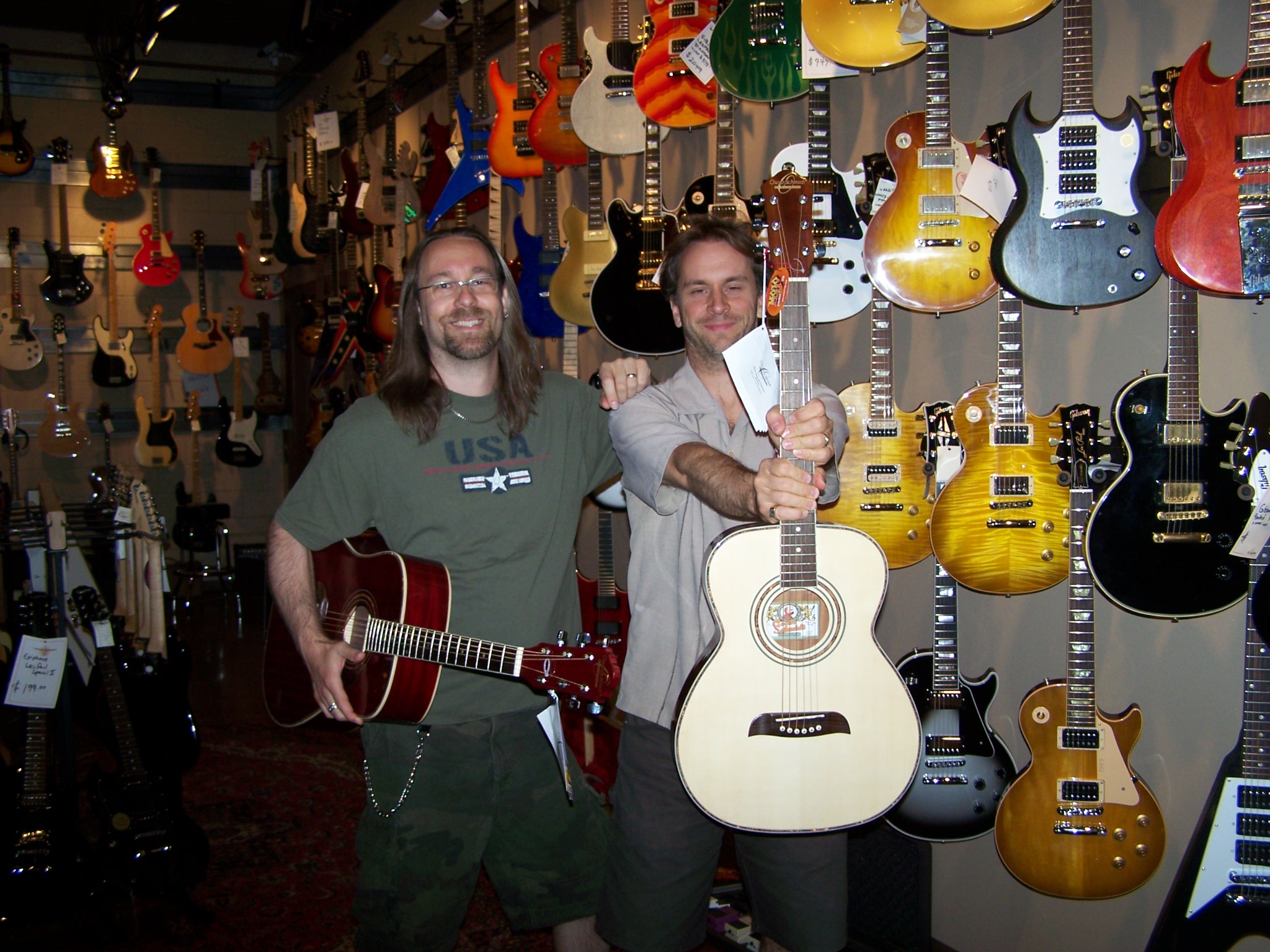
G4V accepts its first instrument donation from Cream City Music’s Joe Gallenberger (right) in 2007.
Nettesheim went to his computer and Googled “Guitars for Vets,” and there was not one return worldwide. Shortly after, a slogan, “The Healing Power of Music in the Hands of Heroes,” followed. Guitars 4 Vets now has provided more than 4,000 guitars and 40,000 lessons to veterans. It costs only $200 to enroll a veteran in the Guitars 4 Vets program, which pays for the guitar and accessories. Guitars 4 Vets now counts more than 110 chapters in 40 states, thanks to the work of more than 500 volunteers.
Guitars 4 Vets also has a strong team on its board of directors, including Pete Ruzicka, who served the Army and Air Force for 24 years combined; Bernard “Bud” Bobber, senior lecturer in the Music Department, Peck School of the Arts at the University of Wisconsin-Milwaukee; MI retailer Ben Kraft of Kraft Music Ltd.; and major general Stephen R. Layfield, whose key staff assignments include serving as the operations officer for V Corps, deputy chief of staff for operations and intelligence for Allied Command Europe Rapid Reaction Corps, and operational duty on the Joint Staff.
Guitar 4 Vets features an even bigger list of music-industry ambassadors. On this list are Tommy Emmanuel, Tony Polecastro, Willy Porter, Sonny Moorman, Breck Philip, Dan Cord, Halestorm, Stiched Up Heart, Tavis Stanley and Ernie C.
“I am so honored to be involved with G4V,” said Emmanuel. “The guitar is a friend to us always. Ready whenever we are, never impatient, never asking too much. Pick one up, and the relationship will be there forever. Together, we can help so many vets get the joy back in their lives through the power of music.”
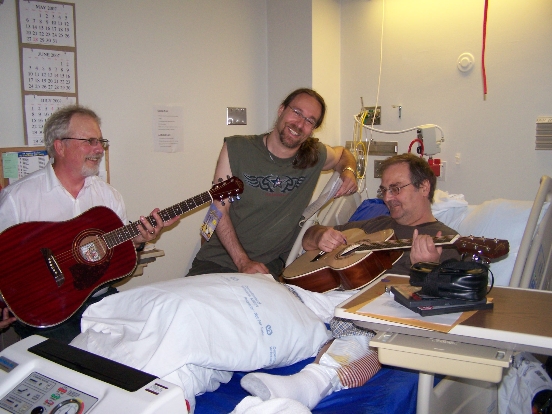
G4V gifts its first set of donated guitars to veterans.
Guitars 4 Vets supporters also include Earl Slick and Scott Ian of Anthrax.
“I think [Guitars 4 Vets is] great, especially after I learned more about it when I was initially approached. I didn’t really understand what it was, and then I got educated on it and found out, even therapeutically, what it means for these guys just to pick up a guitar and learn how to even play a chord, and what it could mean for their psyche,” said Ian. “It’s something I totally believe in, because I truly believe music, as cheesy as it sounds, it is really a common bond through everyone on this planet, every culture, everywhere on this planet. Everybody has music, something that comes from their culture, whatever it may be. But I think music is something that is generally, universally loved on this planet and brings joy to most people. So, if there’s any way I could help bring happiness and certainly help veterans with guitars, it’s obviously a no-brainer.”
Lives Saved
Above all, what’s most important to Nettesheim is how important playing guitar is for veterans dealing with PTSD and their outlook on life. “The most common phrase I hear is ‘It saved my life,’” said Nettesheim. “I always tell them, ‘You saved your life.’ At the end of the day, the person has to want to live. We are throwing them a life preserver. These folks are struggling. All they need is that one thing to live for. A little oxygen on the spark of the flame. It can also get them to see their therapists and get the medicine they need.
“We are not music therapists,” he continued. “When we hire someone to work for us, we use an acronym PAGE. P stands for patience, A for acceptance, G is gratitude and E is empathy. Those are the most important things you need to have. And the guitar is the catalyst for positive interaction.”
Nettesheim recalls a veteran who had served in Operation Iraqi Freedom. He had a lot of rage. The vet told Nettesheim he did not want to take guitar lessons, but his therapist thought he should. Nettesheim saw the vet had a short fuse, so he decided to start with one chord, an E minor. “It is an easy chord to play,” said Nettesheim. “I find it a passionate chord. Some say it is sad, and some say it is romantic, but it gets things moving. He played the chord and played it well. He [later] told me he [wanted to] tell me what he thought of the program. I thought he was going to read me the riot act. But he started to shake, his lips started to quiver and tears started rolling down his face. He strummed the chord again and looked up at me and said, ‘This is the first time I felt peace.’ He ended up playing the guitar really well. He would even sing in the hallways. It is one of the greatest transformations I have ever seen.”
Guitars 4 Vets could not be successful without MI manufacturers’ and retailers’ help. Nettesheim was quick to mention Yamaha, which donates a number of guitars to Guitars 4 Vets each year. Yamaha has supported Guitars 4 Vets for approximately seven years. “Yamaha’s [partnerships and alliances manager] David Jewell has been instrumental,” said Nettesheim. “In fact, in 2019, in honor of us setting up our 100th chapter, Yamaha donated 100 guitars. Ben Kraft of Kraft Guitars also donated 100 guitars every year for the past four years.”
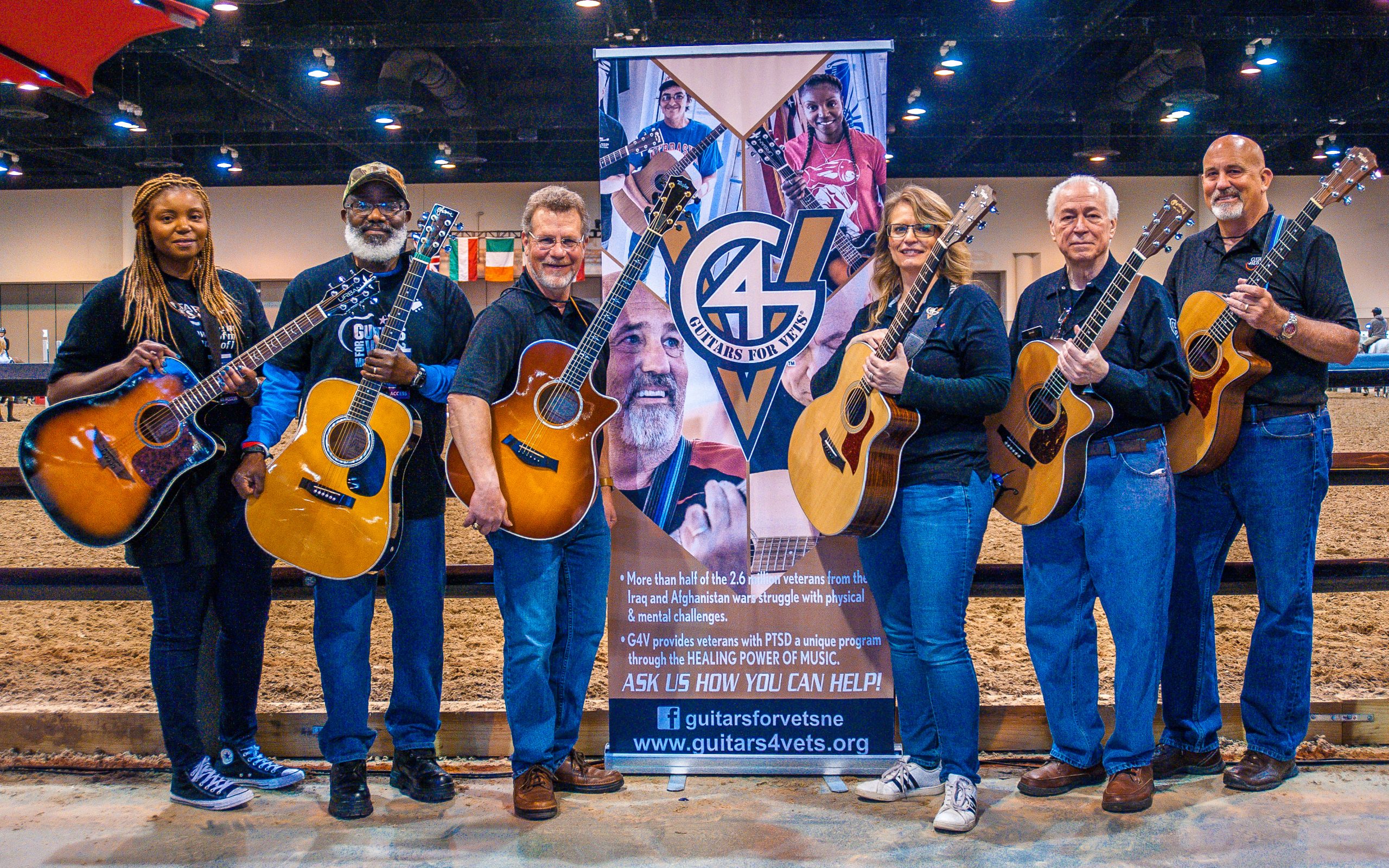
Guitars 4 Vets Omaha chapter
Gibson and its Epiphone brand also provided plenty of assistance. Gibson CEO J.C. Curleigh’s father served in the military, and he loved what Guitars 4 Vets has been doing, explained Nettesheim. “Dendy Jarrett now runs the Gibson foundation, called Gibson Gives. I met him at The NAMM Show [this year],” said Nettesheim. “Meeting people at NAMM is so important for us. We would not be anywhere without NAMM. Dendy loved our idea. Gibson gave us 14 olive-drab-colored custom shop Les Paul guitars so we could give them away to vets. You want to talk about making somebody’s life? Give them a $7,800 guitar. They also gave us 36 Epiphone Masterbilt acoustics and 19,000 sets of strings.”
Many other companies and retailers have also stepped up to the plate to help Guitars 4 Vets’ cause, including Alfred Music Kyser, Reverb, Hal Leonard, Cordoba, TKL, D’Addario, Dunlop, Dean Zelinsky, Heid Music, Hix Bros. Music, Levy’s Leathers and WD Music Products.
Like all others, COVID-19 presented a new challenge for Guitars 4 Vets, as it had to cease in-person lessons. Nevertheless, the organization remains committed to its mission and is ramping up its efforts to use technology to virtually deliver guitar lessons to veterans.
“We’d like you to help us with these digital efforts by accepting a ‘challenge’ to record a brief video guitar lesson that we can post on our social media sites,” the organization stated in a June email. “G4V’s campaign, called ‘Band Together,’ will ask professional and amateur guitar players around the world to either record a short guitar lesson to share with our veterans or donate money to help G4V resume it’s in-person programming when social distancing guidelines are lifted.”
Of course, all politicians have big issues on their plate these days. However, during normal times, one problem still remains regarding the MI industry in general, and it certainly applies to Guitars 4 Vets: There remains a disconnect in terms of politicians understanding the benefits of music making, or at least an unwillingness for the government to fund music programs despite their demonstrable positive benefits. The power of politicians promoting music-making, and specifically the benefits of vets playing music, is something that could perhaps lift charities like Guitars 4 Vets even higher into the stratosphere.
“I don’t think politicians have a nefarious plan regarding music. But I think they fully understand its positive impact,” said Nettesheim. “They believe it would make people happier to talk about the sourcing of additional equipment for high-school football teams as opposed tp musical instruments for school bands and orchestras.”
Nettesheim stressed there are exceptions to this rule, however. U.S. Sen. Russ Feingold (D-Wis.) was responsible for Guitars 4 Vets getting its 501 (c) (3) non-profit status approved. “I went to the head of the [Department of Veterans Affairs] and got an endorsement,” Nettesheim said. “And I knew [Feingold]. He said he would take care of it. After three or four months, he did.”
More information on Guitars 4 Vets, including how to donate and start a chapter, can be found at guitars4vets.org.
To read more features from the Music & Sound Retailer, click here.


